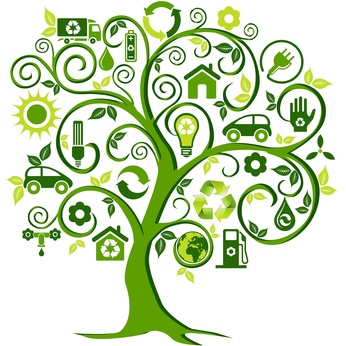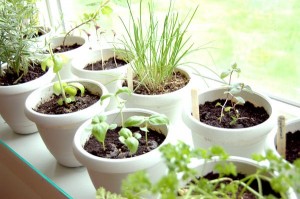Spring is upon us and as did generations before us, we long to throw open the windows, get out our scrubbing implements, and get set for the summer. We long for a fresh start. Maybe to you this means hanging laundry out to dry so your sheets and clothes get that outdoors-y snappy freshness you just cannot replicate in the dryer. Perhaps it means you have a sudden desire to clean the refrigerator that has been stacking up gunk all winter or maybe you are planning a garden and resolving to be more “green”.
A lot of the time the changeover to greener, more sustainable measures of living is cost prohibitive or unavailable. For example, if one is renting a house or apartment it makes little fiscal sense to install solar panels to run the home. These will either need to stay when you leave or the owner of the home will reap the benefit of the rebate. Or both.
Many times I hear people saying “I can’t” to changes that are easily made. This is an excuse. Of course you can. It’s the imagined cost compared to benefit that people are afraid of. So, I have put together some simple, low cost ideas that, while they may not work for you; hopefully will inspire you to try something different.
What’s that? I can hear your laughing. But have you thought about the fact that for the most part furniture nowadays is made from plywood? A material that is basically sawdust held together by petroleum products. It warps, it deteriorates, pets and pests love it. More importantly, it uses up a lot of the resources we want and need to protect like our forests and fossil fuels.
Cardboard furniture is mostly recycled furniture. People have used it before or it has already been made for another purpose. Best of all, it’s usually free. Check out some of the creations of Jose Avila who decked out his home using Fed-Ex boxes.
 Think Hard Before Signing Up For Green Energy
Think Hard Before Signing Up For Green Energy
According to Christina Pfifer at Savingsadvice.com opting for your energy carrier’s Green programs could in fact cost you more. She has a pretty good point. Most electric companies are charging their customers for the cost of their start-up programs; nothing new there.
However, a good portion of the energy is being generated by the garbage you have already thrown away. Garbage you also paid another company to pick up and deliver to methane piles. This is what is called double dipping.
In addition, there is no way to send the green energy directly to your home when you pay for it. You are paying a subsidy to a company that is already getting paid by you. If you live in the U.S. you are most likely already paying subsidies anyway for those less fortunate who need help with their energy bills. How many subsidies would you like to pay for and with scams like these, how long before you need them yourself.
One may be better off just burning candles and cooking over a wood fire.
Recently I was invited to participate in a drive to give cleaning supplies to newly housed homeless families. All in all I thought this was a very good cause. One of the stipulations of their halfway housing is you have to keep things clean.
But then I remembered, I don’t buy any cleaning products, I make them. Also unfortunately this being a government subsidized program, I couldn’t give homemade products. This is something that has always puzzled me, why government programs to help the poor actually want the poor and their helpers to spend more money.
In any case there are so many natural cleaning recipes out there. Most of them begin with vinegar. Vinegar disinfects while getting grime off. My own recipe requires some essential oils that are a bit of an investment so I’ll share this super easy and cheap one from Michael Nolan a.k.a. The Garden Rock Star. This recipe cost pennies. He also has a very good laundry detergent recipe.
While we are on the subject of gardens and rock stars, everyone can be one; now is the time. Nobody truly has a black thumb. That’s like saying “I can’t cook.” You can, you maybe just haven’t been taught or practiced enough. Start slow with something easy like herbs. Herbs are practically indestructible once started and serve the dual purpose of brightening up an area; whether outside or in and being used in cooking. In addition you will save a ton over buying them in the stores.
Another lesson you will learn from attempting to grow things is the cycle of the area you live in. Even if you are less than successful in your first year growing, you will learn how your soil absorbs water, is it clay-like or sandy? Where is the sun at any given time of the day? What plants work when and what is your growing zone? You will become closer to the weather patterns and better able to tell when to conserve water and how the sun affects not only your plants but the energy you use in your home. You will find yourself being better able to anticipate when you can passively cool your home in the summer months and when the air conditioner really needs to be turned on, thus saving you more money.
Another money saving effect of gardening which is often overlooked is less garbage. Most food scraps can be composted as can 100% cotton and paper; not to mention all those lovely coffee grounds. This keeps garbage out of the bin and lets you have a smaller container. In many areas of the U.S. garbage collectors charge less for smaller bins and in areas where you haul your own garbage, you will be paying less at the dump. One can also utilize the age-old practice of watering your veggies with your saved urine, saving on water and making your home a more water-wise one. You will also decrease your stress level and get more exercise, for free.
Obviously turning off our electrical appliances is going to both save us money and help conserve energy. We have heard a lot over the last decade about “vampire electronics”; those things that suck energy even when you aren’t using them. Things like toasters who have little lights on them even when not in use. Cable and Satellite boxes, nightlights, shredders, water heaters and refrigerators.
Some of these things we feel we need. Of course it’s great to have a big fridge to stock things up in. However the cost of these large appliances should have us thinking of ways to utilize them better. In most countries outside of the U.S. people don’t stockpile their food in refrigeration units. They buy their food on a daily basis. This makes good sense for several reasons. One gets to eat the freshest food, but also you are able to get out and hopefully get a little bit of exercise getting there. Also we refrigerate things that don’t need to be refrigerated; Tomatoes in fact taste worse when they have been climate controlled. Most fruits and vegetables are okay to sit in baskets on the counter, butter can be safely kept in a butter bell ; and is easier to spread this way. The more things kept out of the refrigerator, the less times it is opened during the day. It also allows us to downgrade to a smaller model that will use less energy.
The other big energy sucking appliance that can be replaced is the household dryer. Letting the sun do the job of drying both preserves clothing (imagine never having to be disappointed that someone put your prize sweater in the dryer again) and is absolutely free. Last year at the house we replaced an aging 4 sided space-saving clothes line and the cost of the unit was $39.00. But one could just as easily rig a line with some bolts a pulley and some clothes line for under $15.00.
It wasn’t in jest that I mentioned turning out the lights and using candles earlier. In the summertime, it is especially easy to use only candles or solar powered lights indoors at night. You can buy a package of 12 hour candles for less than $5.00. Not enough light? Put a mirror behind them.
We are a country that has grown comfortable and dependant on our luxuries. Judging by the television shows that seem to be booming, we aren’t likely to give up a hell of a lot of comforts without a fight.
All of this is fine. It is not entirely necessary to do so. But there are better ways of meeting our needs while being environmentally conscious. This doesn’t mean buying ugly shoes that donate more ugly shoes to the universe. It also doesn’t mean giving up gourmet cooking or exercise regimes or any of the other things that make us feel special and happy. It simply requires tweaking. A few slight changes can go a long way towards making the lifestyle we want to have both more affordable and more accessible.
Happy Spring Green-ing!






Great tips. I used the vinager cleanser. Works great and is super cheap. Thanks for the link to the cardboard furniture. “Office Desk 2” looks like a disaster waiting to happen. But it is impressive what people can make out of free or low cost items. I love how recycled items are transformed into art, or better yet items we use every day. I hope we all can consume less in order to make what we have (clean water & air as well as healthy food) last longer.
While surviving in El Salvador, I learned the meaning of living green. I hand washed every piece of laundry we had…and hung them to air dry. There are no laundromats there. I had no washer or dryer. I swore I would throw everything I hand washed away when I got back home. I did! I never mastered the art of brushing the dirt out of your clothes. I created worn looking items, stiff towels, and some horrendous looking clothing. But, having said that, I admire the women who can do this.
The cardboard furniture? Not for me. I value the soft pillow topped sofas like no one can imagine after sitting on the rock hard furniture I had in Central America.
But here is what I know. I know how to make my own laundry detergent that works better than the TIDE brand that is now the subject behind some major store heists in Los Angeles…because of the hefty price. (It’s true! Drug addicts are stealing TIDE the way they used to steal beer and cigarettes, here).
I learned to turn stuff off there too. Electricity there is so costly that this is not an option, it’s sanity. I have also learned to reuse things like that snap plastic container that roasted chicken or salads come in from the supermarket. They make great picnic containers if you hand wash them.
As far as my cleaning? I’m buying a place in a few months. I will settle my roots there. Until then, my place is so small it looks like a storage bin. But I won’t walk away without the lessons I learned in El Salvador. I value them now.
Great list of probiotic foods. I need to add some of these to my diet. I love dark chocolate, so maybe i’ll just eat more of that.
The Cardboard furniture is…something…isn’t it. The intention was not to take it seriously but really to think in a different way. There is so much that we have available that is simple and easy and in fact cheaper than buying the crap we are told we need all of the time.
We, at least in the U.S. have been sold a false idea that to be healthy we must eat “organic”( a false label if ever there was one because everything live is organic) food that is quite expensive. Instead we can eat what is in season and not worry so much about the stickers, if it’s in season it’s a safe bet that it’s healthier than say…tomatoes in January.
Countries that have already seen economic crashes of course have learned these lessons, how to get by with less, going back to the old ways, or at least older ones. It’s a good skill to have and to share.